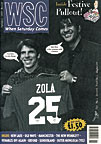 Why football doesn't need a break over winter
Why football doesn't need a break over winter
Changing times, these, and cause enough to worry that a cultural pillar that has stood firm for over a century may be in danger of being whipped away. Every year the base is chipped away a bit more and before too long the pickaxes and elbow grease will be backed up by heavy machinery, leaving us with no football to watch in the winter.
Annual calls for a winter break begin as a murmur in early December (put your head out of the window now and you just catch it on the breeze) and have developed into a full-throated cry by the middle of the month. Tradition dictates that the case will be made first in exasperated, ‘why-oh-why’ tones in the sports page opinion columns, then echoed on TV when highlights programmes are left threadbare by postponements and Tony Gubba gets to do the feature match.
The arguments are familiar: a fixture list decimated by the weather now will cause a pile up in the spring affecting Important Issues of promotion and relegation, quagmire pitches drag down the standard of play, players are liable to get injured in the treacherous conditions, hard-working journalists deserve a peak-season fortnight in Barbados every once in a while, the whole system is biased in favour of the Northern clubs who are more used to the cold and consequently win the Premiership all the time which is totally unfair on fans of glamourous teams like Chelsea.
Most of these points (apart from the last one, of course) are fair enough, incontrovertibly on the button if we want football to continue its march towards meritocracy. But for the duration of winter, ideals we nurture about teams playing thoughtful, creative football that showcase the players’ natural skills, are suspended, subordinated to the more pressing demands of the moment.
Basically, going to football matches helps take the edge off the dark depression that settles over much of the nation during the gloomiest winter months – the crowds that continue to flock to football in December and January are doing so because it cheers them up. And it’s the nature of what they’re watching that helps keep the worst of the seasonal melancholia at bay: to varying degrees depending on the conditions and the players’ adaptation to them, it’s pantomime, a parody of football.
For most of the rest of the season football tends to pan out in a predictable way – the teams that play well win, the poor teams lose. But in the winter, football becomes a lottery, and what could be more cheering in the dark days of January than to throw aside rationality and abandon ourselves to the swirling winds (and the sleet and the drizzle) of chance?
Winter football offers a host of warmly familiar scenes guaranteed to raise flagging spirits. A goalbound shot hits the ground with a splat and adheres to a small sticky patch around the penalty spot where several sets of legs set about it, kicking up great plumes of spray. It might suddenly fly into the goal, it’s just as likely to be hoisted straight up into the air again to the bafflement of the players underneath who are peering through mud-spattered eyes in every direction but the right one. Both sets of players, caked in viscous mud from head to toe within moments of the kick-off of both halves (apart from one who mysteriously keeps his shorts in pristine shape throughout), spend every free moment blowing on their hands and hunching up their shoulders like reluctant goalkeepers on a schools pitch. Tempers simmer along at just below boiling point throughout; clumps of mud are thrown.
Your team may be hurtling towards relegation on the back of a playing style like some monstrous hybrid of rugby and mime but you know there’s always a chance that at some point over the winter they’ll get a 5-0 win, possibly in the Third Round of the Cup, because they happen to have the right studs in when opponents are sliding around like Bambi. It’s unfair and messy and exactly what we’ve been thriving on for a century.
Take it away and there’s a huge gap, doubtless to be filled, as happens abroad, with a rash of indoor tournaments warped by gimmicky rules and continuous organ music belting out as the teams sweep back and forth scoring 20 times in each half. Our clubs wouldn’t stop playing, either: they’d simply scoot off to warmer climes and international tournaments in South Africa or Saudi Arabia. The nation, bereft, would sink into a collective torpor, seeking relief in drink, drugs or, worse still, basketball.
What would happen to the pools panel? This is an important drop-in centre for retired players and gives them a sense of purpose and self-worth. Without it they’d be forced onto the snowy streets where they’d wander up and down, waving their form cards and shouting about how they used to hold the destination of a million pound jackpot in the palms of their hands. But nobody would listen.
Worst of all one of our most treasured clichés, older even than the first call for a Winter break, would disappear for good: as every supporter knows, a player dancing through tackles in August hasn’t proved himself until ‘we see what he’s like in the mud at Boundary Park in January’. There wouldn’t be any more football Januarys in Oldham or anyone else. An eerie silence would have settled over every football town in the country for the duration of the winter, broken occasionally the parping of a distant organ and a hellish cry, ‘It’s 18-17 . . . !’
Remember that when the Winter breakers are in full flow, allow yourself a shudder and turn away.
From WSC 119 January 1997. What was happening this month